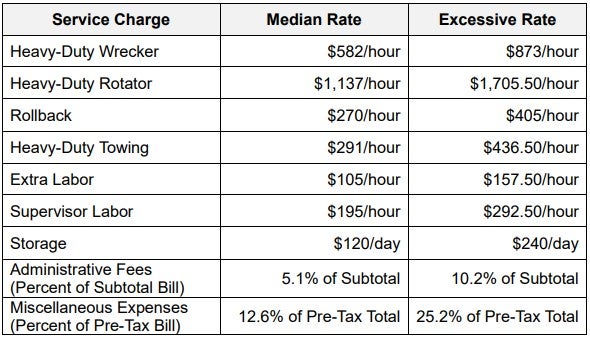Freight News:
Indiana tops predatory truck-towing list
New data compiled by the American Transportation Research Institute underscores the severity of predatory towing fees charged in the aftermath of large truck crashes and offers recommendations to address the problem.
ATRI’s survey of motor carrier-reported towing incidents and analysis of variations in the frequency of predatory incidents occurring in 2021 revealed that — relative to motor carriers’ mileage — Indiana had the most disproportionately high share of predatory towing incidents, followed by New Jersey.

“The top ten states are located in all parts of the U.S., confirming that there is no regional pattern to predatory towing incidents,” according to the study, which ATRI released on Wednesday.
The study found that excessive rates and unwarranted additional service charges were the two most common forms of predatory towing, experienced by 82.7% and 81.8% of surveyed motor carriers, respectively.
In addition, ATRI’s analysis of truck crash-related towing records found that 29.8% of invoices were found to include either excessive rates or excessive additional charges. Roughly half of these cases had excessive rates for equipment, labor or storage, and the other half had excessive miscellaneous or administrative charges.
“Claims involving predatory towing are definitely on the rise,” according to Adam Brand and Shahan Kapitanyan, who were interviewed by ATRI as part of the study for their legal expertise on the issue.
“We are receiving assignments throughout the United States involving grossly inflated tow, recovery and remediation invoices. Reasons for these increases include training provided to T&R [towing and recovery] companies aimed at increasing the amounts they can bill insurers, communication between T&R companies who have successfully recovered payment on inflated invoices, and a general understanding by the public that inflating a T&R claim or invoice is acceptable.”

The study points out that a “patchwork of municipal, county, and state regulations” currently governing towing are often insufficient to prevent predatory activities against truckers.
“Of the states that have more robust statewide regulations of the T&R industry, regulatory authority can fall under the jurisdiction of a variety of agencies, including state police or departments of public safety, departments of transportation, consumer affairs, or utility commissions,” the study notes. “The wide range of jurisdictions that regulate the T&R industry can make it difficult for interstate motor carriers to know what protections are at their disposal.”
The study includes a compendium of state towing regulations along with recommendations on improving regulatory coverage areas to close loopholes.
For example, state regulations should support allowing motor carriers to choose their preferred towing and recover company whenever possible, the study recommends, and regulatory language “should explicitly define crash site conditions in which this choice is applicable.”
Lewie Pugh, executive vice president of the Owner-Operator Independent Drivers Association, which contributed data for the study, said the issue centers around “non-consensual” tows, which usually occur when towing companies are called not by the truck driver involved in the accident but by the highway patrol concerned with clearing accidents as quickly as possible.
“We don’t have a problem with that, the problem we do have is that some towing companies will take advantage of truckers when someone else calls for the service, because in many cases there are no state laws or agencies that oversee that type of situation,” Pugh told FreightWaves.
“If there’s no regulation like in most states to address unscrupulous towing companies, it’s an open checkbook. I’ve seen itemized bills where they’ve charged $1,000 for using their radios on a tow. We’ve seen bills go well into six figures.
“It’s a huge problem in the industry that kind of flies under the radar.”
Related articles:
- Carrier fights $47,000 tow bill in Wyoming; towing company disputes total
- Towing fraud, staged accidents targeted by new coalition that includes ATA
- ATRI: Trucking congestion costs hit record $94.6B
Click for more FreightWaves articles by John Gallagher.
The post Indiana tops predatory truck-towing list appeared first on FreightWaves.
Source: freightwaves - Indiana tops predatory truck-towing list
Editor: John Gallagher